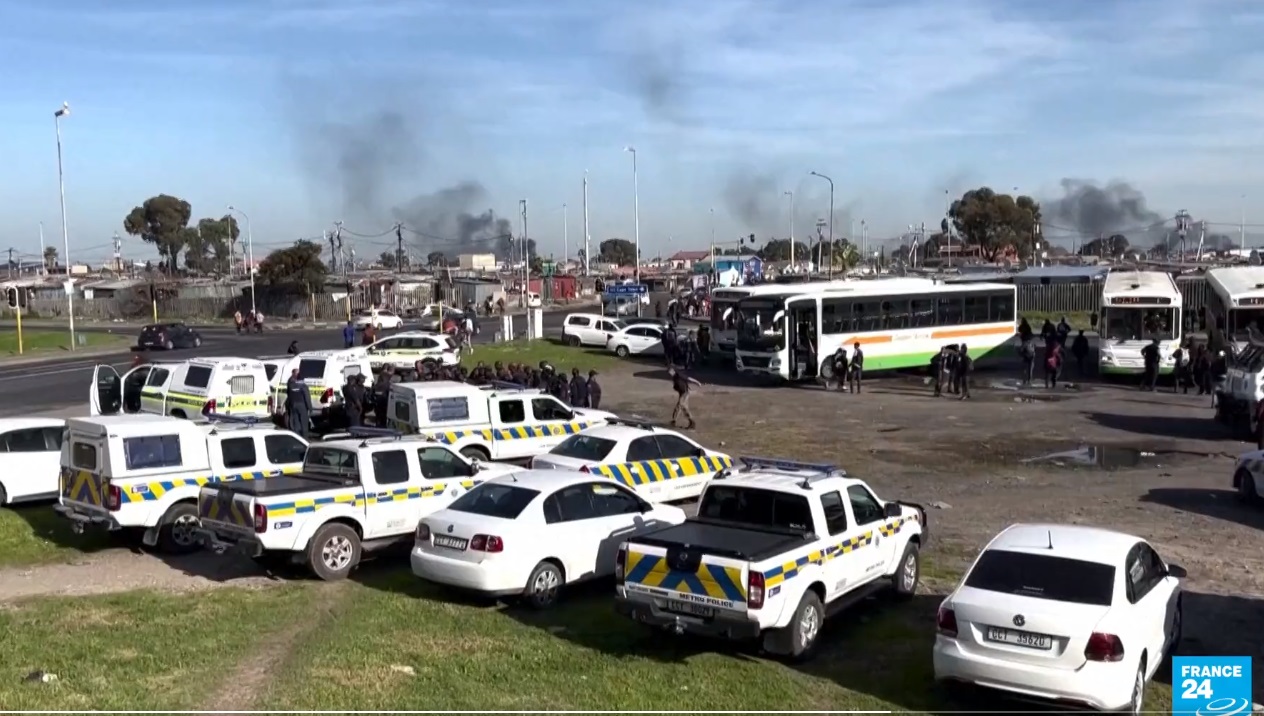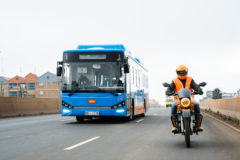The Western Cape branch of South Africa’s taxi union has called off a strike protesting a new by-law that allowed the City of Cape Town to impound vehicles instead of fining drivers for not displaying registration plates. The new law also states that cars can be impounded if they’re unlicensed, overloaded or don’t stop when they’re instructed to do so by a police officer. Taxi operators say the by-law targets them unfairly.
The week-long ‘Taxi Stay Aways’ grounded public transportation to a halt even as Cape Town hosted the Netball World Cup. Under South Africa’s 1996 national road rules, licensed drivers who are not carrying their licences are issued a fine but are allowed to continue the trip. But under the new by-law, the City of Cape Town fines offending drivers and impounds the vehicle.
The protests turned violent almost immediately. “Taxi owners and drivers, who were attending Santaco’s meeting in Makhaza, Cape Town, to decide on whether to strike, walked out of the venue and pelted a law enforcement vehicle with stones,” The Daily Maverick, a South African publication reported.
The Western Cape branch of South Africa’s taxi union has called off a strike that put South African ride-hailing drivers in the line of fire as protests led by South Africa’s most powerful taxi union ground public transport in Cape Town to a halt. While South Africa hosted the final of the Netball World Cup in Cape Town, last week, the South African National Taxi Council (Santaco) announced a week of ‘Taxi Stay Aways’ to protest a new by-law that allowed the City of Cape Town to impound vehicles instead of fining drivers for not displaying registration plates, being unlicensed, overloading not stopping when instructed to do so by a police officer. Taxi operators say the by-law targets them unfairly and vowed to continue the strike until the by-law is repealed.
Under South Africa’s 1996 national road rules, licensed drivers who are not carrying their licences are simply issued a fine but are allowed to continue the trip. But the new by-law, the City of Cape Town fines offending drivers and impounds the vehicle.
The strike turned violent almost immediately after the strike was announced. “Taxi owners and drivers, who were attending Santaco’s meeting in Makhaza, Cape Town, to decide on whether to strike, walked out of the venue and pelted a law enforcement vehicle with stones,” The Daily Maverick, a South African publication reported.
The strike forced commuters to walk long distances to get back home from work and school. People turned to ride-hailing services despite a sudden surge in prices. Local media reported that dozens of passengers who could not get buses or ride-hailing services slept at bus stations or their workplaces.
According to the Western Cape Department of Mobility, taxis (mostly made up of 13 to 16-seater Toyota minibuses) provide 75% of public transport in the province and transport about one million passengers daily. South Africa’s taxi industry generates up to 100 billion rand annually, according to a 2021 report by the country’s Competition Commission. In the Western Cape, with its capital in Cape Tow, taxis can make up to R1.5 million daily, Bonginkosi Madikizela, a former Western Cape for official Transport and Public Works said in September last year.
“The taxi industry has strong national political clout with the African National Congress (ANC),” Abel (name changed), a Cape Town resident told TechCabal. It is also one of South Africa’s most violent industries, with a history of stiff competition for routes between competing unions. A September 2022 report on organised crime from the Global Initiative Transnational Organised Crime estimated that half of all organised murders in South Africa between 2015 and 2020 were related to the taxi industry. At least 110 taxi-related murders were reported by the Western Cape Government between April 2021 and March 2023.
Other forms of public transport, including ride-hailing have been fiercely and even fatally resisted by the taxi industry. In 2017, two Uber drivers suffered burns when their vehicles were set ablaze—one driver died from injuries. It is a persistent theme across markets where ride-hailing workers have been attacked by taxi drivers for ‘stealing customers’.
On Friday last week, the Western Cape E-hailing Association (WCEA) which represents drivers who work for Uber, Bolt and In-Driver announced that it was joining the strike action after its members declined to vote for the strike in the Santaco meeting that began the strike the previous day. Ride-hailing services were one of the few options for commuters who were stranded by the strike and subsequent attacks on Cape Town’s MyCiTi and Golden Arrow Bus vehicles. As violence increased, private vehicles belonging to Uber drivers or regular motorists were attacked and set on fire in Langa and other parts of the city.
“I’ve been busy since morning as people do not have any alternative to get to work. They are using Uber,” Simba, a ride-hailing driver told The South African last week. “I have to ask the passenger for the destination of the trip because there are areas that are very dangerous… when you have a client, they will ask you to take the client out and they will take the car or burn the car.“
Uber said its drivers in Cape Town were completing trips normally despite “some joining the strike.”
WCEA, the ride-hailing union said it was joining the strike to ask the city government to cancel rules that require cars used for ride-hailing to have taxi metres installed. ”This provision is clearly an attack on the already declining living conditions and poor income of drivers in the e-hailing sector.” Like the taxi union, it also wanted the city’s government to stop vehicle impoundments.
But the videos of burning vehicles circulated on social media groups and posts warning ride-hailing drivers to not take advantage of the strike to earn from increased prices suggest there was more behind the decision to back the taxi unions.





















